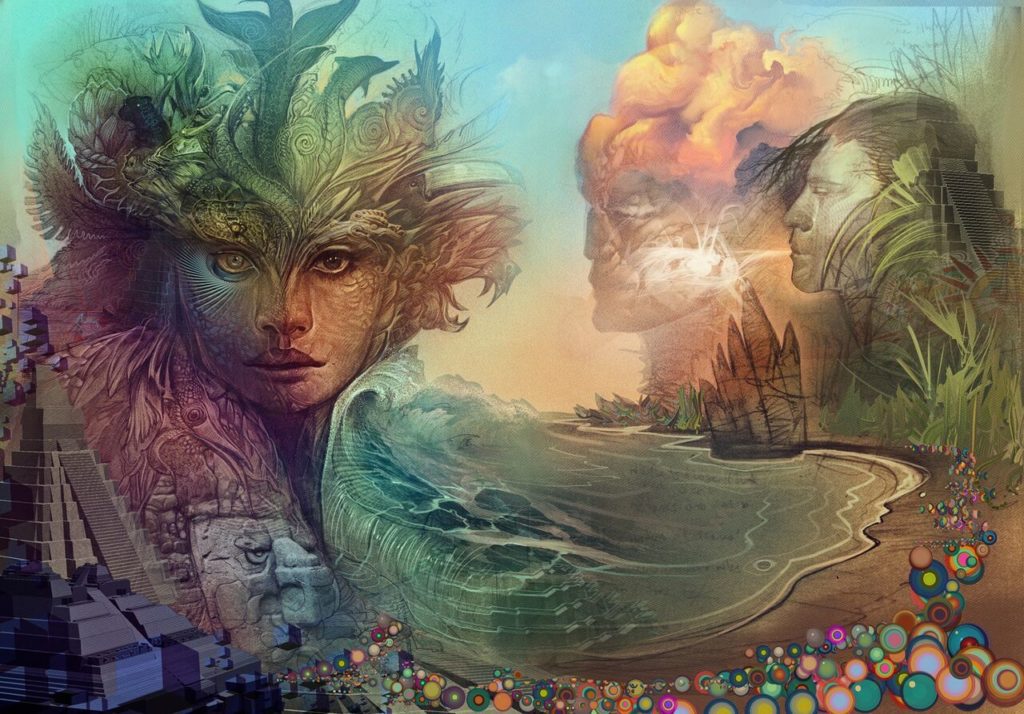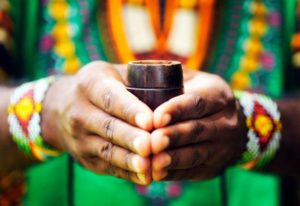Can Ayahuasca Heal Depression?

Depression is a common mental disorder that currently affects more than 300 million people worldwide. Long-lasting depression, with moderate to severe intensity, can become a serious health condition that not only impacts an individual’s ability to function in day-to-day life, it can also result in suicide. According to the World Health Organization, nearly 800,000 people die due to suicide each year. Suicide is the second leading cause of death in 15-29-year-olds.
Efforts to cure depression, especially long-lasting depression have been met with limited success, especially for the segment of people whose condition is non responsive to antidepressants. 1
Which is why scientists are excited when a new potential treatment for depression is discovered…or rediscovered.
The recent shift in attitude around psychedelic research and the potential of LSD, magic mushrooms, and ayahuasca to treat depression has lead to promising scientific studies.
In recent years, ayahuasca and depression are so frequently referenced together in the same breath, that it seemed like common knowledge for this Amazonian psychedelic potion to be guzzled down to solve mental ailments such as depression.
MUST READ: Can Ayahuasca Really Treat PTSD?
The indigenous peoples have long used ayahuasca to cure a range of ailments, including sadness, and personal testimonies from Westerners on how ayahuasca cured their depression abound. Finally, it seems like science is catching up.
However, while the findings are compelling, the answer may be more complex than you first think…
But what does the science really say in comparison to the anecdotal claims?
To really understand the answer to this question, we need to unpack a few things first…
What Is Depression?
If we take the popular belief of what depression is, we learn that this mental illness is caused by low levels of serotonin, which destabilizes one’s mood, resulting in a cascade of depressive like symptoms.
This is why antidepressant pharmaceutical drugs are prescribed – to increase the levels of serotonin, essentially rebalancing one’s mood.
This explanation seems simple enough, right?
This is what we’ve been told by doctors, psychiatrists and the pharmaceutical industry.
The problem is, contrary to popular belief, depression is NOT typically the result of ‘low serotonin’ levels, nor is it an imbalance that needs to be fixed with antidepressant drugs. 2
In fact, countless studies are highlighting the disconnect between the information we’ve been indoctrinated into by authorities and advertisements, and what the scientific literature is actually revealing. 3
New knowledge on psychiatric conditions such as depression has been trickling into the mainstream for some time now, but is still overshadowed by what is shown through popular media.
Kelly Brogan, MD, is one of many psychiatrists and leaders in the field who are taking a stand against the outdated antidepressant model for the treatment of psychiatric syndromes and symptoms. Board certified in psychiatry, psychosomatic medicine, integrative holistic medicine, and specializing in root-cause resolutions, Dr Brogan’s research is contributing to a better public understanding of the scientific root-causes of depression.
Which then begs the question…
According to science, what IS the root-cause of depression?
Enter the field of psychoneuroimmunology.
A New Understanding of the Root Causes of Depression
Don’t be scared off by the fancy word.
As Dr. Brogan explains, it simply refers to “examining (and respecting) the complex interplay between various systems and organs of the body, especially those that syncopate the nervous, gastrointestinal, and immune systems in a brilliant dance that in turn affects mental well-being.”
What the field of psychoneuroimmunology is telling us, is that depression is in fact a SYMPTOM of inflammation.
According to Brogan, “patients who are told they have psychiatric conditions originating in their head or related to some (fictitious) brain chemical deficiency actually share real biological imbalances related to their immune-inflammatory pathways.” 4
Numerous researchers assure us that depressive symptoms are linked to significant inflammatory components, with studies showing undeniable links between inflammation, cortisol and gut dysfunction, and the brain. 5
While there are many sources of inflammation, including sugar, processed food, food intolerances, leaky gut, toxic chemicals, pathogens and stress, what these inflammatory markers are essentially reflecting, is a state of bodily disharmony. 6
So, it seems quite compelling that the current research suggests that depression isn’t due to low serotonin, or being born with bad genes. It highlights depression being a non-specific complex symptom, more than likely due to an unhealthy inflammatory response, an imbalanced gut microbiome and cortisol dysfunction.
But What About Cases When Antidepressants Work?
Great question.
Dr Irving Kirsch, Professor of Psychology at the University of Hull in the UK, has highlighted through his research that the majority of antidepressant effects are largely attributable to the “active placebo effect”.
Because people have been indoctrinated into the belief that receiving a brain-chemical-corrector will actually help alleviate symptoms, to some extent, it actually does. 7
The impressive phenomena of belief and placebo has been well documented, in particular, by Bruce Lipton Ph.D, and Dr. Joe Dispenza. 8
The thing is, for these cases, it seems to be a short-term fix, and certainly not a long-term solution.
There are studies that debunk the serotonin deficiency model further, with certain pharmaceutical drugs on the market relieving symptoms of depression, without even touching the serotonin system, acting instead on the dopamine, norepinephrine, and cholinergic systems. 9
Dr Kelly Brogan makes a very valid point when she asks the question: “If we cannot confirm the role of serotonin in mood and we have good reason to believe that antidepressant effect is largely based on belief, then why are we trying to “boost serotonin”?” 10
A report that was recently released from the U.S. Centers for Disease Control and Prevention, stated that antidepressant use by Americans over the age of 12, rose by 65 percent between 1999 and 2014. 11
Antidepressants are one of the three most commonly used therapeutic drug classes in the United States. 12
This is clearly a major problem.
When the western pharmaceutical model is completely out of alignment when it comes to our health and wellness, it makes complete sense as to why people are seeking alternative treatments for depression and other psychiatric conditions.
This is where ayahuasca comes in.
Brazil’s First Ayahuasca Depression Study
In 2015, the first clinical study on ayahuasca and depression was conducted by researchers in Brazil, led by Jaime Hallak, a neuroscientist at the University of São Paulo. 13
Although it only included six participants, the conclusion was that ayahuasca had fast-acting anxiolytic and antidepressant effects in those with depression.
The study was critiqued by James Stone, psychiatrist at King’s College London, in an article published by both Nature and Scientific American. 14, 15
Having studied how psychoactive drugs affect the brain, he pointed out that the study was “interesting but should be viewed with caution because it had no placebo group.”
He went on to say that “Placebo response is a well-documented effect in clinical trials of antidepressants. The only things that can really be concluded from this study are that it is tolerated by patients with depression, and in these people did not seem to have any serious side effects following a single dose.”
Fast-forward to August, 2017…
MUST READ: The Uncensored Guide to Preparing for Ayahuasca Ceremony
Results of a Double-Blind Placebo-Controlled Study on Ayahuasca & Depression
Draulio Barros de Araujo, a professor of neuroimaging at the Brain Institute in Brazil, and his team, published their research paper on their double-blind randomized placebo-controlled trial, in which 29 patients with treatment-resistant depression received a single dose of either ayahuasca or placebo. 16
Honestly, the results weren’t all that surprising.
The study provided evidence of rapid antidepressant effects of ayahuasca for treatment-resistant major depression, when compared to placebo.
In an article published by New Scientist earlier this year, Charles Grob, Professor of Psychiatry and Pediatrics at UCLA, stated, “There is clearly potential to explore further how this most ancient of plant medicines may have a salutary effect in modern treatment settings, particularly in patients who haven’t responded well to conventional treatments.” 17
Leanna Standish, a neuroscientist and professor at the Bastyr University Research Institute in Seattle, has been trying to study the therapeutical potential of ayahuasca for 15 years. The FDA has finally given approval for her to conduct the first US trial investigating ayahuasca as a treatment for depression, which begins in 2018. 18
Is it too soon to state that I think we’re going to see similar conclusions?
I think Draulio Araujo summed it quite succinctly in his talk at the OPEN Foundation’s Interdisciplinary Conference on Psychedelics Research.
When it comes to understanding the acute effects of ayahuasca, what the studies are trying to do, is “bring a scientific representation to what we already know from an intuitive perspective of people that have been drinking ayahuasca for a long time.” 19
So far, the science is matching the thousands of anecdotal accounts from around the globe, not to mention what our indigenous brothers and sisters have been claiming all along – that ayahuasca is a worthy ally when it comes to mental ailments such as depression.
And while these results are probably expected, as far as I know, it still leaves some interesting fundamental questions unanswered…
HOW Exactly Does Ayahuasca Treat Depression?
According to the 2015 article in Nature, it’s “biochemically plausible that ayahuasca could treat depression — its plants contain compounds that alter the concentrations of the mood-regulating neurotransmitter serotonin in the brain — as do commercial antidepressants.” 20
But what about the countless studies on depression that debunk the serotonin deficiency model?
If depression is not primarily caused by low serotonin, as the studies say, and is moreso associated to inflammation, then how does the interaction between the serotonergic system and psychedelics, like ayahuasca, affect depressive symptoms?
I’m not sure I have the answers here, but what I DID find interesting were the studies that pointed out the effects of both DMT, and the harmalas found in the Amazonian brew, on inflammation in the body.
Ayahuasca & Its Effects on Inflammation
The beta-carbolines found in the ayahuasca vine itself, harmine and harmaline, have been shown to have significant anti-inflammatory and immune-modulatory effects. 21
According to a 2016 study on the therapeutic potentials of ayahuasca, it was found that “ayahuasca may act against chronic low grade inflammation and oxidative stress,” by acting on the sigma-1 receptor. 22
This same receptor was of interest in a 2014 study on DMT and inflammatory responses.
The results concluded that DMT, another component of the ayahuasca brew, might be more than JUST a neuromodulator or psychedelic, as it was shown to affect the same sigma-1 receptor, making it a promising candidate for chronic inflammatory conditions. If psychedelic research continues to progress forward, the future could highlight a new biological role for DMT. 23
So at this stage, the outcomes suggest that ayahuasca DOES play a part in reducing inflammation in the body.
As great as all of this scientific research is, there’s still a major aspect of the psychedelic experience that science can’t measure or account for.
The subjective, transcendental, inner spiritual experience…
Depression & Spiritual Disconnection
The pharmaceutical model tells us depression stems from low serotonin. The science is telling us it’s bodily inflammation. Ask an indigenous shaman, or someone deeply connected with their spiritual essence, and they’ll likely mention that depression arises from a disconnect with our true self.
In an interview with Psychedelic times, Matthew Watherston, founder of the ayahuasca center Temple of the Way of Light, says that “True healing is not about ‘curing’ but bringing the whole body back into alignment.” 24
The whole body includes the physical, emotional, mental, energetic and spiritual aspects of our being.
We know that ayahuasca and other psychedelics allow dissolution from our ego and physical sense of self, allowing us to ride the waves of inter-dimensional consciousness. It’s unanimous that these transcendental experiences and journeys into alternate realities have a significant impact on those who choose to drink this Amazonian brew.
Hundreds, if not thousands of anecdotal accounts exist online, from those who undertake this ineffable white-knuckle sleigh ride, experiencing mind-blowing mystical states of consciousness, often being catapulted from dimension to dimension, coming into contact with seemingly intelligent sentient beings in realities that stretch beyond our imagination.
After experiencing something of this nature, it opens the doors of perception to see the bigger picture, allowing us the recognition that we’re connected to something much larger than just our individual sense of self.
As far as the practical side of the equation goes, the beauty of these journeys is that they allow us to see things from different angles, restructuring and reframing limiting perspectives and beliefs.
They allow us a bird’s eye view of our personality, our character, our habits and patterns.
They allow the integration of fragmented parts of our psyche.
They help open our hearts to allow forgiveness, compassion, understanding, love and peace.
They provide the opportunity to relive past experiences and undergo extraordinary healings, often resolving traumas from our past that contribute to our imbalances, such as depression.
The science even tells us that depression is potentially due to responses from our stress-system that were ingrained at birth, or even in-utero. 25
Perhaps ayahuasca contributes to our healing by restoring these dysfunctional patterns across all levels – the physical, mental, emotional, energetic and spiritual.
What seems to be the case, is that in these states, we reconnect to something both beyond ourselves, and deep inside ourselves. The essence of who we really are.
When we place all of the pieces of the puzzle together, it seems likely that depression IS merely a symptom, telling our body, mind and spirit to come back into alignment.
MUST READ: How to Choose an Ideal Ayahuasca Shaman, Facilitator or Retreat Center
So, Does Ayahuasca Heal Depression?
The research and the anecdotal evidence found all over the internet is compelling. Ayahuasca certainly can help heal depression. But I wouldn’t be so quick to state that ayahuasca heals depression completely.
While there are no long-term follow ups regarding the studies, there are many subjective accounts telling stories of being completely healed or even cured from depression.
But if depression is just a symptom of being out of alignment, is it not possible for someone to fall out of alignment once again on their journey through life?
After returning from my own first pilgrimage to the Amazon Rainforest, I was in a joyful medicine afterglow for quite some time. But the ebb and flow of the emotional waves finally made their way to my shore. The peaks were high, but the valleys were low.
Very low.
Occasionally I fell into chasms of depressive episodes and suicidal thoughts while I navigated my path of healing and personal evolution. It was only through being committed to the work, shining the light on my darkness, and exploring and discovering what it meant to become an integrated human, that the waves smoothed out and I could ride the road of equanimity.
And I think that’s where the beauty of ayahuasca comes into play. It allows us to take a holistic snapshot of our lives and take the steps to realign ourselves with our health and wellness across all levels.
After beginning the work with ayahuasca, many people take up a meditation practice, exercise more, pay attention to diet, eliminate processed foods, spend more time in nature, and generally reassess and recalibrate all areas of life to reduce stress and eliminate inflammation.
Sometimes however, these changes don’t come easy or naturally.
Just as “Ayahuasca heals depression” is a common catch phrase, so too is “Integration is the hardest part!”
And great integration involves plans, it involves strategies, it involves support. Not to mention that great integration starts with great preparation.
So while ayahuasca may not heal depression completely, at the very least, it certainly plays a significant role in the immediate reduction of depressive symptoms. Combined with proper preparation and integration practices, this visionary plant medicine can certainly aid those who wish to heal their depressive symptoms, opening a lifelong pathway for us to come back into reconnection and realignment with our health, wellness, virtues, values, heart and spirit.
References
- Depression
- Your Gut Flora Could Determine Your Mental Health
- Serotonin and Depression: A Disconnect between the Advertisements and the Scientific Literature
- How Inflammation and Depression Gave Birth to New Medicine
- Depression: It’s Not All in Your Head
- Psychoneuroimmunology Meets Neuropsychopharmacology: Translational Implications of the Impact of Inflammation on Behavior
- Placebo Effect: Antidepressants at it Again
- The Biology of Belief: Unleashing the Power of Consciousness, Matter & Miracles
- Back to Basics 3: The Serotonin Theory of Depression
- Depression: It’s Not Your Serotonin
- US Antidepressant Use Jumps 65 Percent in 15 Years
- Antidepressant Use Among Persons Aged 12 and Over: United States, 2011–2014
- Antidepressant Effects of a Single Dose of Ayahuasca in Patients with Recurrent Depression: A Preliminary Report
- Ayahuasca Psychedelic Tested for Depression
- Ayahuasca Psychedelic Tested for Depression
- A Randomized Placebo-Controlled Trial on the Antidepressant Effects of the Psychedelic Ayahuasca in Treatment-Resistant Depression
- Psychedelic Drug Ayahuasca Improves Hard-to-Treat Depression
- The Ayahuasca Ceremony is Going Under the Scientific-Method Microscope
- Acute, lasting and antidepressant effects of Ayahuasca
- Ayahuasca Psychedelic Tested for Depression
- Pharmacological and Therapeutic Effects of Peganum harmala and Its Main Alkaloids
- The Therapeutic Potentials of Ayahuasca: Possible Effects against Various Diseases of Civilization
- Psychedelic N,N-Dimethyltryptamine and 5-Methoxy-N,N-Dimethyltryptamine Modulate Innate and Adaptive Inflammatory Responses through the Sigma-1 Receptor of Human Monocyte-Derived Dendritic Cells
- Ancient Medicine in a Modern World: How Ayahuasca Can Heal the Plague of Depression and Anxiety
- How Inflammation and Depression Gave Birth to New Medicine


